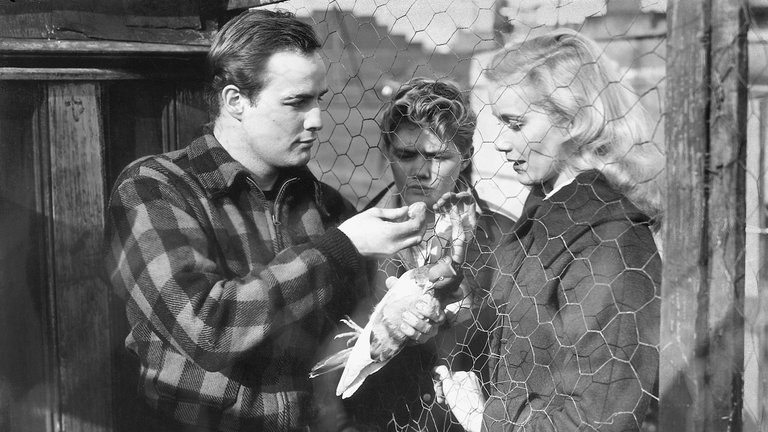Film Review: On the Waterfront (1954)

Some great films are born from personal motivations, and 1954 drama On the Waterfront stands as a prime example. Elia Kazan's most controversial moment in life served as the inspiration for his greatest career triumph, shaping a classic Oscar-winning film that delves into themes of conscience, corruption, and redemption.
The film is loosely based on true stories of corruption within New York dock worker's unions, drawing from Pulitzer Prize-winning newspaper articles by Malcolm Johnson. It follows the protagonist Terry Malloy (played by Marlon Brando), a former boxer turned longshoreman entangled in the grip of the tyrannical and corrupt union boss Johnny Friendly (played by Lee J. Cobb). One of his errands for Friendly results in death of Joey Doyle, fellow longshoreman who was about to testify against the union at crime commission hearings. Although Terry didn’t think that Friendly’s thugs go further than merely threatening Joey, he at first doesn’t think much of the incident. But his involvement in a tragic event leads him on a path of moral awakening, spurred by the activism of Father Barry (played by Karl Malden) who wants his parishioners to stand up to thuggery and even more by his love for Joey's sister, Edie (played by Eva Marie Saint). As Terry begins to question his loyalty to Friendly and code of silence, his brother Charley (played by Rod Steiger), who works as union’s lawyer, tries to warn him of the consequences of going against unwritten rules.
Elia Kazan was known for extracting exceptional performances from his actors, and his directorial prowess shines in On the Waterfront. None of them can match Marlon Brando, who had worked with Kazan on two of his previous films and enthusiastically adopted Method acting. His portrayal of Terry Malloy, a man grappling with his conscience, is a standout, showcasing the depth and nuance of Method. Brando's performance earned him his first Oscar for Best Actor, solidifying his place in cinematic history.
While Brando's performance dominates the screen, the supporting cast delivers stellar performances. Karl Malden, with his ordinary looks brings depth to his role as the crusading Father Barry making the character realistic despite his idealism, while Lee J. Cobb embodies the villainous Johnny Friendly with chilling intensity. Rod Steiger, another master of Method acting, appears relatively little in the film, but he nevertheless shines in in the iconic “I could have been contender” scene shared with Brando. Eva Marie Saint’s portrayal of Edie, a woman of understated “girl next door” charm, earned her an Oscar for Best Supporting Actress.
The ensemble cast, complemented by Boris Kaufman's black-and-white cinematography and authentic locations, creates a compelling visual narrative that immerses viewers in the gritty world of Hoboken, New Jersey. Leonard Bernstein's melodramatic soundtrack adds emotional depth to the film, though at times it veers towards excess. Despite this, the film's widescreen format, which was novelty at the time, and modern cinematography techniques make it visually striking and engaging for contemporary audiences.
"On the Waterfront" carries a significant personal resonance for Kazan, reflecting his controversial 1952 testimony during the HUAC hearings when he publicly exposed friends and colleagues as Communists, thus ruining their lives and careers. This decision allowed Kazan to maintain his career and clout in Hollywood and Kazan later defended it in his memoirs, even confirming speculations that the film’s portrayal of informing as a heroic act was allegorical justification. The controversy nevertheless followed Kazan to the rest of his life, including very public snubbing as boos by many actors that attended Lifetime Achievement Academy Award ceremony many decades later. Some might view On the Waterfront as reflection of Kazan’s newly discovered right-wing politics, but also as the film that established Hollywood’s tradition of depicting unions and labour movement in general as something corrupt and evil.
While generally maintaining its realism, On the Waterfront loses some of it near the finale, which is overly melodramatic and not so convincing in its attempts to provide something of a happy ending to the audience. However, its timeless themes of morality and redemption, coupled with exceptional acting, cement its status as a legendary classic in cinematic history.
RATING: 8/10 (+++)
Blog in Croatian https://draxblog.com
Blog in English https://draxreview.wordpress.com/
InLeo blog https://inleo.io/@drax.leo
Hiveonboard: https://hiveonboard.com?ref=drax
Rising Star game: https://www.risingstargame.com?referrer=drax
1Inch: https://1inch.exchange/#/r/0x83823d8CCB74F828148258BB4457642124b1328e
BTC donations: 1EWxiMiP6iiG9rger3NuUSd6HByaxQWafG
ETH donations: 0xB305F144323b99e6f8b1d66f5D7DE78B498C32A7
Posted using CineTV